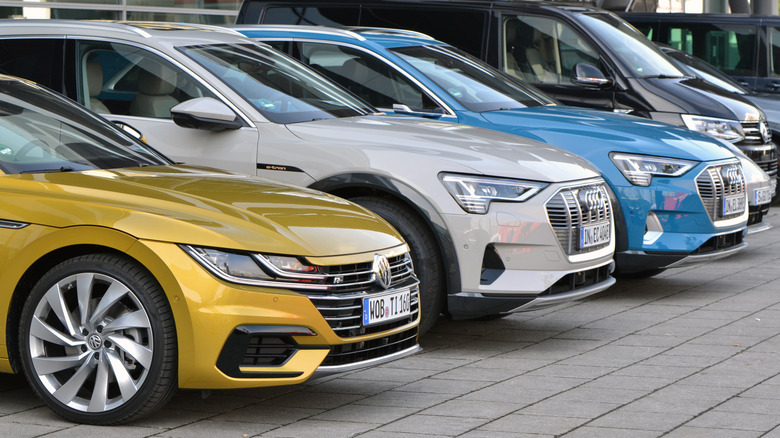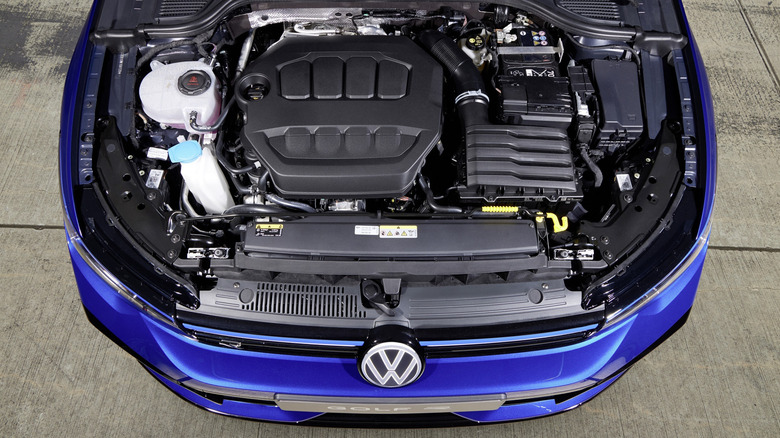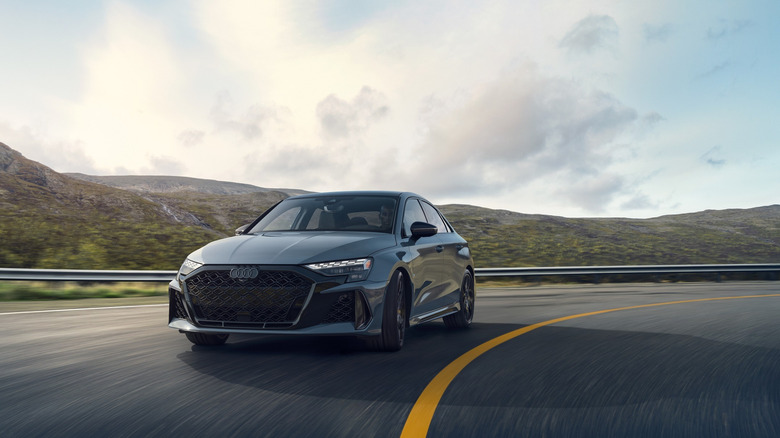Who Makes Audi Engines And Are They The Same As Volkswagen's?
For several decades, German luxury car brand Audi has been part of the larger Volkswagen group. Originally a subsidiary of Daimler-Benz, it was in 1964 that Volkswagen acquired a majority stake in Audi, a company which was until then known as Auto Union GmbH. In 1966, Audi officially became a wholly-owned subsidiary of Volkswagen, a status it maintains to this day. Given that Volkswagen has had control of Audi for over six decades, it goes without saying that this group structure lets Volkswagen share automobile platforms, components, and technology with Audi, as well as other Volkswagen brands like Porsche, Lamborghini, Bentley, Seat, and Skoda.
Our research to answer the question of who makes the engines that go into Audi cars yielded interesting results. To begin with, we were able to establish that an Audi-operated facility in Gyor, Hungary, is the largest engine-manufacturing facility in the world, and that it accounts for a significant percentage of engines made for various Volkswagen-operated brands. In 2024, this facility made 1,580,991 powertrains which were then shipped to the 30-plus Volkswagen Group production sites (including the 16 locations owned by Audi) across the globe.
So, the answer to the original question, "who makes Audi engines," has a very straightforward answer: It's Audi that makes a good number of them. In fact, it wouldn't be entirely wrong to say that an Audi-operated facility makes engines not only for itself, but also for the rest of the Volkswagen Group companies. Now, regarding the second part of the question about Audi engines being the same as Volkswagen's, the answer to this question is somewhat nuanced. However, it is indeed true that some engines found on Audi cars are also found on Volkswagens.
Shared engines: The common core across Audi & Volkswagen
One of the biggest strengths of the Volkswagen Group is how it saves money and effort by sharing parts across its many brands. Instead of designing a new engine for every single car, the company builds modular engines that can be used in different models, across multiple brands, albeit with small tweaks to match each brand's personality.
The best example is the EA888 2.0-liter turbocharged four-cylinder engine. This motor is used in various cars across the Volkswagen Group. In the U.S., it powers the Audi A3 and the Volkswagen Tiguan, both making 201 hp. Step up a notch, and the Audi Q3 and Volkswagen Jetta GLI share the same version with 228 horsepower. Move higher still, and the performance-focused Audi S3 and VW Golf R both carry a 328-horsepower version of the same engine. Even family crossovers share it: the Audi Q5 makes 268 horsepower from this motor, while the VW Atlas offers 269. The now-discontinued Audi A4 also gets a version of the same engine rated to make 261 horsepower, very close to the 241-hp engine found in the VW Golf GTI.
Of course, Audi doesn't just copy and paste. While the hardware — the block, cylinders, and head — is largely the same, Audi typically invests in smoother throttle response, extra sound insulation, and different turbo tuning for brand-specific cars. This makes its them feel more refined and "premium," even though the core engine is shared with a Volkswagen.
As outlined earlier, this practice of sharing engines keeps prices under control and simplifies production, but it also means many Audis don't have completely unique engines. What sets them apart is the way they are tuned and finished, not the raw metal under the hood.
Are there any Audi-exclusive engines?
Despite Volkswagen deciding to share engines with multiple car brands — Audi — the group's luxury-focused subsidiary has managed to hold on to a few engines that are either exclusive to the brand or so closely tied to its identity that they're practically an Audi trademark.
The best example of this is Audi's famed 2.5-liter TFSI five-cylinder engine that was first introduced in 1976. By the 80s, early variants of this engine powered Audi's Quattro rally cars. The modern version of this engine is still used to this day. In the U.S., you'll only find it in the Audi RS 3. Until 2022, it was also used on the now-discontinued Audi TT RS. This engine is also used on the limited production Cupra Formentor VZ5, a rare high-performance crossover made by Cupra, a lesser known brand owned by the Volkswagen group.
As for the rest of Audi's bigger engines, most of these are shared with other premium brands in the Volkswagen Group. For example, the 4.0L twin-turbo V8 TFSI powers the Audi RS 6 and RS 7, but can also be found inside the Porsche Panamera GTS and Cayenne GTS, as well as the Bentley Continental GT, the Bentley Bentayga, and the Lamborghini Urus. Then there is the 5.2L V10 FSI that is found on the Audi R8 as well as the Lamborghini Huracan, which made it to our list of the best sounding engines.


